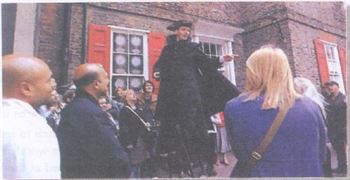FCE making adverbs
لیسنینگ اف سی ای درباره ی خانه ی جن زده

Language focus 1: Modal verbs for speculation and deduction
1 Here are Laura's possible thoughts, when she was speculating about who had put the bottle on the path. Read them and answer the questions below.
'I suppose a prankster might have left the bottle there, or else it might have come from a marooned ancient mariner. Actually, though, the bottle is shiny and new, and has obviously never been in the sea, so it can't have been an old sea dog. That means a joker with too much time on his or her hands must have done it.'
1 Which of the forms in bold express:
a possible explanations for who left it?
b certainty about who didn't leave it?
c certainty about who left it?
2 Which verb form is used after each of the modal verbs?
3 Which of the following modal verbs can be used in place of might in the first sentence above without changing the meaning?
could should can may
Check your ideas on page 216 of the Grammar reference and read more about modal verbs for speculation and deduction.
2 Speculate about what might have happened in the following situations. Write two or three sentences for each using modal verbs.
Example: 1

She could have just received some bad news.
She may have had an argument with a friend.
She might have been peeling onions.
1 Angela's crying.
2 Paul's face and hands are very dirty.
3 The kitchen window is broken.
4 There's a red mark on Derek's shirt collar.
5 Lucy was late for school.
6 Nobody in the class did their homework last night.
3 Match each of the sentences 1-6 with a suitable continuation a-f.
1 Don't make too much noise. (b)
2 What do you mean, you don't know what to do?
3 Would you lend me yours?
4 I can't find her name on their webpage.
5 You should ask her.
6 I want everyone to search the area.
a She might not be working there any more.
b He might still be asleep.
c He can't have got very far.
d You can't have been listening to my instructions.
e I must have left mine at home.
f You never know; she might be interested.
4 Look at sentences a-f in exercise 3 again and for each one decide whether the speaker is talking about the past or present. What form of the verb is used after the modal verb in each case?
5 Use modal verbs to speculate about possible contexts for each of the sentence combinations in exercise 3.
Example: 1 This could be a mother speaking to her children. They might be playing in the house and their father may be ill in bed.
Listening 1
Part 4
Multiple choice 1.60
1 You are going to listen to a radio interview with a ghost walk guide. What do you think happens on a ghost walk? What does the guide do?
2 Listen to the interview. For questions 1-7, choose the best answer(A, B or C).

Oh, it is, it's fascinating. I've been a tour guide before but mostly abroad and never here in my own home town. I wouldn't call myself an expert, but I've learnt quite a lot about our local history since I started doing this a couple of years ago. Plus, of course, I get to dress up and tell lots of ghost stories. Acting and storytelling have always been in my blood, so I'm really just doing what comes naturally to me. I have a great time.
And how about those who actually go on the tours? Do they get frightened?
Well, obviously these are ghost walks, so it wouldn't be much fun if there wasn't a bit of fear involved. Not too much, of course - we often have children in the groups, so we have to be careful. But people expect to be scared, and they'd be disappointed if they weren't, so we aim at least to give them goose bumps, and perhaps even a little fright - after which they all laugh nervously and enjoy the release of tension.
And how do you achieve that, giving them a fright?
Well, the mark of a good storyteller is the ability to hold an audience's attention, and that's not too hard to do when the subject is ghosts.
You take the listeners into vour confidence, create the right mood, make them feel safe with you. Then, just at the right moment, when they're least expecting it, you change the tone, give a shout or let out a scream. And they nearly jump out of their skin!
Right, yes. And does it work every time?
Well, it does with most audiences, people who've been thinking about the ghost walk all day, maybe all week, wondering what's going to happen. These people usually respond extremely well. Some of the groups we get, though, come along as part of a surprise event. People like these haven't had time to reflect on what they're coming to, they haven't been given the chance to look forward to it, and the effect isn't the same.hey don't normally have such a good time, unfortunately.
You mentioned dressing up before.
Do you do the ghost walks in character?
Yes, I do. And I have different costumes for different characters - there's Lord Warwick, a wealthy noble, the old sea dog Jake Redburn, John Simpkins, who's a servant ... none of them real, of course - they're all fictitious. The choice of character I play often depends on the route we take and the stories to be told, or also perhaps how I'm feeling that night and the type of audience I'm expecting. As with all acting, it adds a sense of truth to the whole thing, makes it more credible. So the audience becomes engaged in the tour and responds in a more positive, sometimes more frightened way.
One question, I have to ask you, Alan.
Do you believe in ghosts?
Regrettably, I have to say that I haven't seen any on the walks,
or had any other paranormal experiences to impress you with. Some people in my audiences say they have, and so have some of my friends, and I wouldn't dare dispute that or suggest they're imagining things. Ghosts are real for those people who say they've seen them, and who am I to suggest they haven't? The most I can say is that I have no personal evidence they exist.
And of the stories that you tell on your ghost walks, do you have a favourite?
Well, I particularly like stories which involve smells that some buildings are said to give off when ghosts are around. I don't want to give away too much here on the programme, but the one I enjoy telling most of all is about an old woman called Sally Hardcastle, who haunts the town hall. When she appears every now and again, the place absolutely stinks. Now at first, some people thought it was a problem with the rubbish, but if you want to find out the real reason: you'll have to come along on the ghost walk.
Oh! We're curious now, Alan. And, if you are interested in going on a ghost walk with Alan ...
1 Alan says his job as a ghost walk guide has enabled him to
2 Alan says that participants in the ghost walks
3 According to Alan, what quality enables a storyteller to frighten audiences?
4 What type of people do not usually enjoy the ghost walk so much?
5 What does Alan say about playing different characters on the ghost walks?
6 When talking about the possible existence of ghosts, Alan says that
7 When talking about his favourite ghost story, Alan says that
3 Have you or has anyone you know ever had 'a paranormal experience'?
Do you believe that ghosts and haunted buildings exist?
Would you be interested in going on a ghost walk? Why/Why not?
Word formation: Adverbs
1 In these sentences from the listening, write the adverb formed from the adjective in brackets. 1 They all laugh (nervous). 2 These people (usual) respond (extreme) well. 3 (regrettable), I have to say that I haven't seen any on the walks.
Check your answers in the listening script on pages 229-30. What are the rules for the formation of the adverbs in the above examples?
2 Write the adverbs formed from these adjectives. The same rule applies to both adjectives in each pair.
Example : beautiful (beautifully) total (totally)
1 complete sole
2 simple gentle
3 lucky extraordinary
4 scientific dramatic
3 Write the adverbs formed from these adjectives. These should be leai nt separately.
1 whole 2 shy 3 full
4 public 5 true
4 Complete each gap with an appropriate adverb formed from the noun or verb in capital letters at the end of the line.
APPEAR ACCIDENT INCREASE ORIGIN DAY REPEAT CARE HEALTH
1 Sue's not coming to work today. , she's suffering from stress.
2 I deleted all the photos on my camera yesterday.
3 Cycling is becoming popular in this city.
4 This museum was built as a palace.
5 Mike's still in hospital, but his condition is improving .
6 They had been told not to play near the main road.
7 Tim was stopped by the police and accused of driving .
8 Lynne does a lot of exercise. However, she eats far too .


